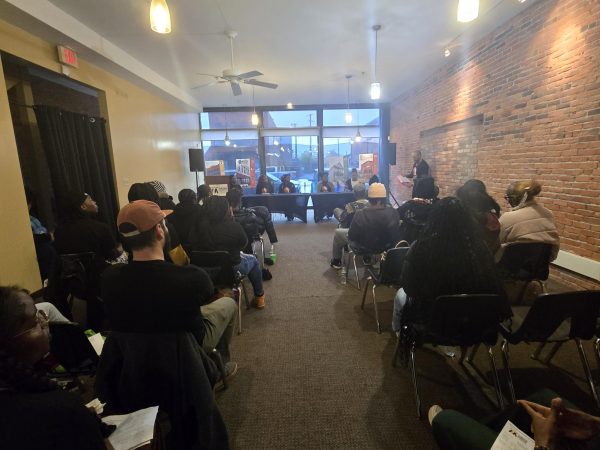Jury out on whether tattoos should be allowed in workplace environment
Imagine waiting for an interview for your choice career. While there, you notice a man with prominent tattoos next to you waiting to be interviewed for the same position. What are your initial thoughts?
Believe it or not, it matters. And depending on the field and the prospective employer, it could have a varying effect.
According to Michael Littman, professor and chair of the business department, hiring managers do look at tattoos depending on the business they are hiring for. He said that the amount of contact with the public might be considered when deciding on hiring a person.
“An impression of the company is based on what they (the public) see,” Littman said.
“The government doesn’t protect tattoo wearers. There is no legal protection for someone with tattoos being discriminated against.”
Littman has not observed tattoos becoming more prominent in professional settings, which he said is probably due to people keeping them covered. He added that more creative professions, such as arts and design, might be expected to have employees with tattoos. The content and location of the tattoos are important factors of the impression they leave on other people.
Professor Joseph Marren, chair of the communication department, isn’t bothered by tattoos. Although the tattoos would have to be taken into consideration for a reporter, he wouldn’t exclude them from getting the job because of them.
“It’s all about perception,” Marren said. “I have to take that into consideration because you’re representing the newspaper.”
If an editor is hiring and they look at a person’s tattoos when making the decision, “they’re messing themselves up,” Marren said.
“As an editor, I looked for a good writer and a good reporter,” he added. “I didn’t care if he or she had tattoos. If you’re a great writer or a great reporter, I will find a place for you.”
There is a lot of variation in communications, depending on the demographic of the readers or viewers. People reading The Wall Street Journal may be less receptive to tattoos than people who read Artvoice.
Also, print reporters may have more leniency than broadcast reporters when it comes to having tattoos, simply because broadcast reporters are in front of a camera. The more visible you are, the less likely you are to have tattoos that show.
Another popular field of study is education. There is an ongoing debate as to whether it is acceptable for a teacher to have a tattoo.
According to Dianne McCarthy, associate professor in the elementary education and reading department, there is no place for ink when it comes to teaching in a classroom.
“I think that tattoos are not acceptable in the educational system,” McCarthy said. “Should a teacher or principal choose to have a tattoo, every effort should be made to have it covered when working with children.
“The attire of the teacher should not distract the student,” McCarthy continued. “Tattoos can cause such a distraction.”
Contrary to McCarthy’s belief, many college students would not mind if their professors had tattoos.
“It wouldn’t make a difference as long as they’re intelligent enough to teach me what they’re supposed to,” said Jessica Gray, a junior majoring in history education. “I don’t think it should make a difference and living in Buffalo. I don’t think a lot of people care.”
So why is there no consensus?
As chair of the anthropology department, Lisa Anselmi is well read in the cultural development of humankind. Although she is not aware of the specific data, Anselmi said that there has been a shift in the number of people getting tattoos.
“I’ve seen them on people of all different ages,” she said. “I would say, I suppose, that people 45 and under tend to have more than people 50 and over. It’s not so much that it’s truly generational. I think maybe, it’s more like a fad.”
While some groups are becoming more accepting of tattoos, others still don’t approve of them, and certain religions still forbid tattoos in their practice. Also, in recent years, the trend has gravitated toward larger tattoos, which are harder to hide and may prevent the wearer from getting a job in their chosen career.
This doesn’t stop people from wearing their hearts on their sleeves — literally.
“I would think in the United States and Canada, that we’re probably on a trend toward personal expression, and tattoos are one way to do that,” Anselmi said.
Overall, though tattoos have become more mainstream, more conventional fields, like business and medicine, are not likely to hire people with visible ink.
“It all depends on the culture of the business,” Anselmi said. “So, in certain work places it will be very acceptable, but in others it still won’t be acceptable.”
Email: wimmer.record@live.com










